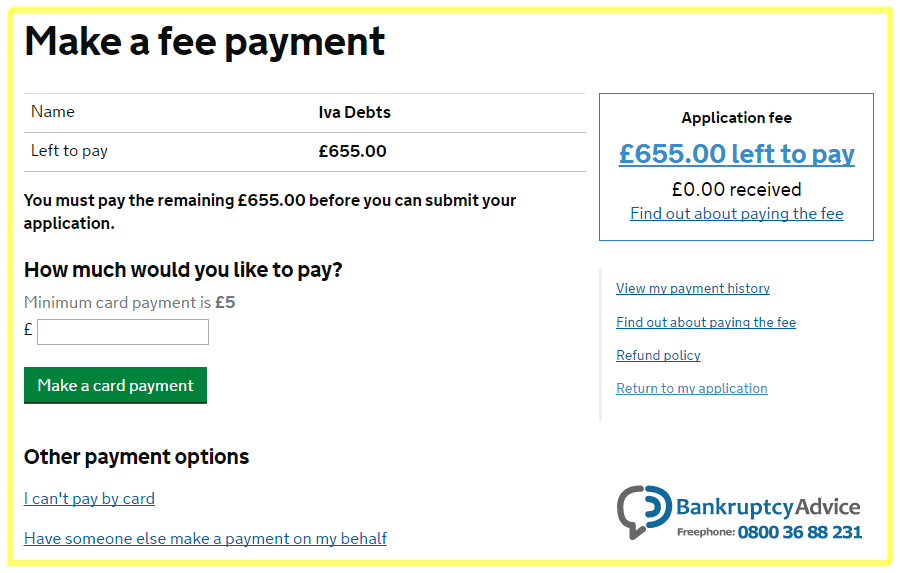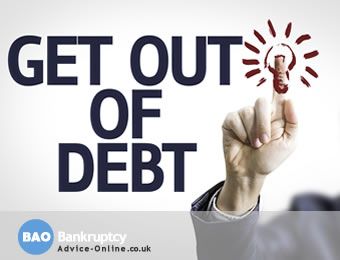Cost To Go Bankrupt?
Bankruptcy Helpline
0800 368 8231
How Much Does It Cost To Go Bankrupt?
Most people are shocked when they find out the cost of making yourself bankrupt.
Sadly there's no such thing as "going bankrupt for free".
This guide shows you how much you have to pay and when.
The cost to go bankrupt in the UK actually depends on where you live.
We'll show you how to get help if you can't afford the fees to go bankrupt.

Costs of going bankrupt:
The cost to go bankrupt varies throughout the UK.
This might sound ridiculous, but applying to go bankrupt is not cheap.
You have to pay the Official Receivers deposit of £550 and the £130 Adjudicators fee.
So the total cost to go bankrupt in England and Wales is £680.
Use our Free Online Bankruptcy Check to see what help you can get.
The good news is that this can now be paid in installments, the minimum installment is £5.
You used to have to pay cash at court but now you can pay online using your card and the online bankruptcy fee payment system.
This means you don't have to pay all you bankruptcy fees at one, you can pay a bit at a time, using the time it takes to save up the fees to enter all the details on the system. However you can not submit your application until the fees have been paid in full.
You can also authorise someone else to pay you bankruptcy fees for you.
You can apply to go bankrupt and get more information on fees at the apply-for-bankruptcy.service.gov.uk website

If you are on a low income or get benefits, and your debts are less than £20,000 then you should check if you can get a debt relief order (DRO for short).
If you qualify for a DRO is it only costs £90 to apply.
Bankruptcy cost in Northern Ireland
In Northern Ireland bankruptcy fees total £647.
- The court fee of £115
- The Official Receivers deposit of £525
- Solicitors fee of £7
Bankruptcy in Scotland costs
In Scotland bankruptcy fees total £200.
- The Accountant in Bankruptcy fee is £200
Going bankrupt in Scotland has a different process to the rest of the UK, you can read our full guide on how to go bankrupt in Scotland here.
Going bankrupt on benefits
If you are getting means-tested benefits such as JSA, ESA or Pension Credit, you used to be able to fill in a form ex160 to get the bankruptcy court fee waived, however since 06 April 2016 this has been removed.
Help with bankruptcy costs
If you're struggling to raise the fee and deposit you need, a charity or trust fund may be able to help.
Many of the utility companies run trust funds that help customers with utility debts and other financial problems, including paying bankruptcy fees.
These include:
- British Gas Trust
- EDF Energy
- Thames Water
- and United Utilities
The team at Bankruptcy Advice Online can quickly advise you if you qualify for help with your bankruptcy fees.
Just call free on 0800 368 8231 or click the "check now" button below.
Can you get help with bankruptcy fees?
Check nowUse our Free Online Bankruptcy Check to see what help you can get.
How much does a "joint bankruptcy" cost?
If you are a married couple and you are both applying for bankruptcy, you will each have to pay separate fees. There is no such thing as a "joint bankruptcy" for personal debts.
If you were in business as a partnership, each partner will have to pay separate fees, unless all the partners apply for a joint bankruptcy petition under the Insolvent Partnerships Order 1994 (Form 16). Form 16 is available from the court or a copy can be printed from The Insolvency Service website
How do I pay?
The above fees should be paid in cash or postal orders, or by a cheque from a building society, bank or solicitor. Cheques should be made payable to H M Paymaster General. Personal cheques will not be accepted.
From 6 April 2016 you will apply to go bankrupt online, and you will also be able to pay your bankruptcy fees online.
Need Bankruptcy Advice?
Our bankruptcy experts can quickly advise you on what to do if you are considering going bankrupt. Simply call the team FREE on 0800 368 8231.
Alternatively take the online bankruptcy test and check if you qualify.
More Bankruptcy Advice:
What Is An IVA?
ReadAn individual voluntary arrangement or IVA for short, works as an alternative to bankruptcy...

How Long Does It Take To Go Bankrupt?
ReadSo how long does it take to go bankrupt? Bankruptcy can be implemented very quickly but it can vary depending on your individual circumstances...
What Is A Debt Relief Order? (DRO)
ReadWondering if you can get a debt relief order, sometimes referred to as DRO? This section explains what a debt relief order is, and the steps you need to take to apply for a debt relief order...





